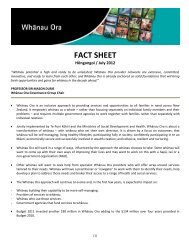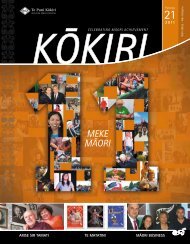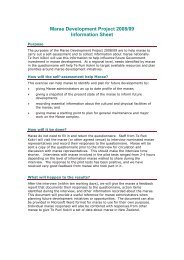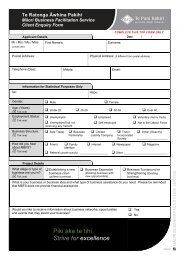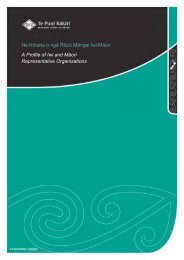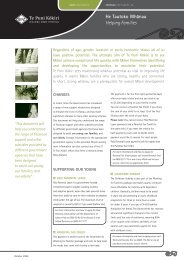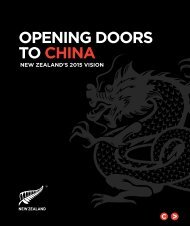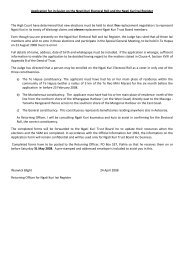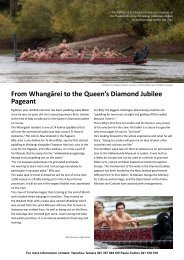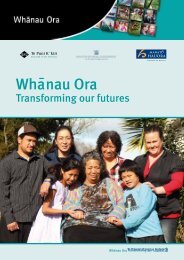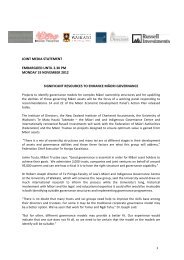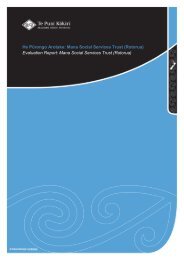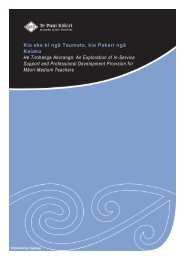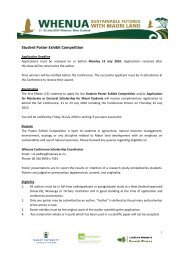Whanau Ora : Report of the Taskforce on Whanau-Centred Initiatives
Whanau Ora : Report of the Taskforce on Whanau-Centred Initiatives
Whanau Ora : Report of the Taskforce on Whanau-Centred Initiatives
You also want an ePaper? Increase the reach of your titles
YUMPU automatically turns print PDFs into web optimized ePapers that Google loves.
• iwi working al<strong>on</strong>gside providers and whānau to support cultural<br />
development and whakapapa c<strong>on</strong>necti<strong>on</strong>s, recognising that whānau<br />
identity and whakapapa play a key part in whānau wellbeing<br />
• iwi and providers working collaboratively within clearly defined areas<br />
<str<strong>on</strong>g>of</str<strong>on</strong>g> comm<strong>on</strong> interest to benefit whānau wellbeing.<br />
5.3 Summary<br />
5.3.1 Whānau, providers and iwi alike expressed <str<strong>on</strong>g>the</str<strong>on</strong>g>ir commitment to finding<br />
ways to improve outcomes for whānau. Whānau want to take ownership and<br />
c<strong>on</strong>trol <str<strong>on</strong>g>of</str<strong>on</strong>g> <str<strong>on</strong>g>the</str<strong>on</strong>g>ir destinies and guide <str<strong>on</strong>g>the</str<strong>on</strong>g>mselves and <str<strong>on</strong>g>the</str<strong>on</strong>g>ir future generati<strong>on</strong>s<br />
towards brighter futures. There was a str<strong>on</strong>g emphasis <strong>on</strong> <str<strong>on</strong>g>the</str<strong>on</strong>g> importance <str<strong>on</strong>g>of</str<strong>on</strong>g><br />
educati<strong>on</strong> throughout <str<strong>on</strong>g>the</str<strong>on</strong>g> interviews, with whānau wanting to be armed with<br />
knowledge and skills that will transport <str<strong>on</strong>g>the</str<strong>on</strong>g>m to better life outcomes.<br />
5.3.2 One <str<strong>on</strong>g>of</str<strong>on</strong>g> <str<strong>on</strong>g>the</str<strong>on</strong>g> key barriers identified by providers and whānau was that<br />
government service design and delivery did not always align with whānau<br />
needs and that <str<strong>on</strong>g>the</str<strong>on</strong>g> attainment <str<strong>on</strong>g>of</str<strong>on</strong>g> successful outcomes was being thwarted<br />
by this disc<strong>on</strong>nect. The critical comp<strong>on</strong>ents for success identified by<br />
providers and whānau were c<strong>on</strong>sistent with <str<strong>on</strong>g>the</str<strong>on</strong>g> intent and directi<strong>on</strong> <str<strong>on</strong>g>of</str<strong>on</strong>g><br />
<str<strong>on</strong>g>the</str<strong>on</strong>g> proposed Whānau <str<strong>on</strong>g>Ora</str<strong>on</strong>g> framework.<br />
5.3.3 These comp<strong>on</strong>ents, when implemented within a sound policy framework,<br />
have <str<strong>on</strong>g>the</str<strong>on</strong>g> potential to unlock <str<strong>on</strong>g>the</str<strong>on</strong>g> latent potential in <str<strong>on</strong>g>the</str<strong>on</strong>g> relati<strong>on</strong>ships between<br />
government, providers, whānau and iwi to accelerate Māori social and<br />
ec<strong>on</strong>omic development. The resulting relati<strong>on</strong>ships will more closely<br />
reflect <str<strong>on</strong>g>the</str<strong>on</strong>g> spirit and intent <str<strong>on</strong>g>of</str<strong>on</strong>g> <str<strong>on</strong>g>the</str<strong>on</strong>g> Treaty partnership, and <str<strong>on</strong>g>the</str<strong>on</strong>g> model may<br />
indeed serve as a model <str<strong>on</strong>g>of</str<strong>on</strong>g> success not <strong>on</strong>ly for whānau but also for many<br />
n<strong>on</strong>-Māori New Zealand families.<br />
41



